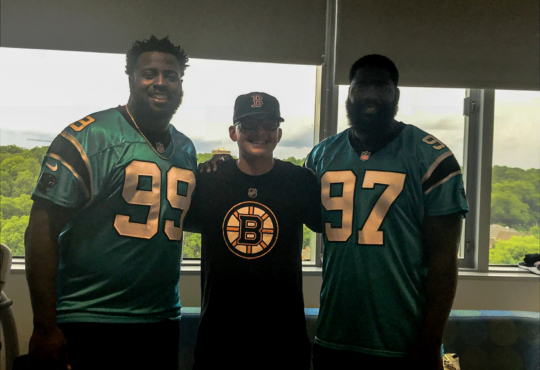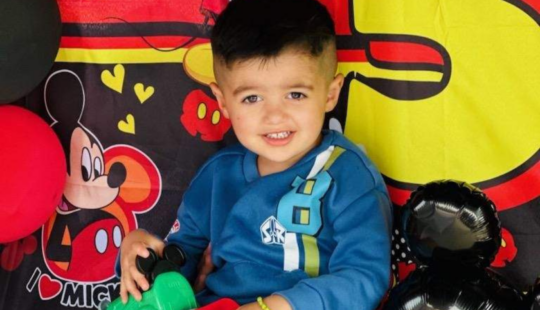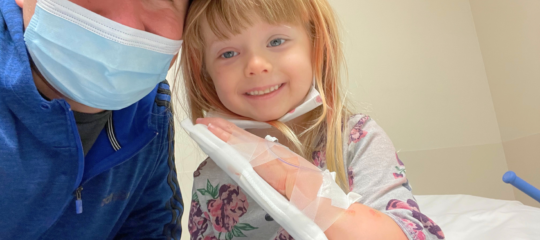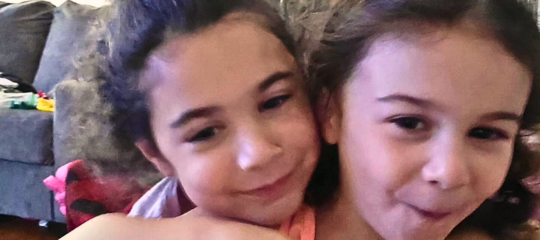
Swift Action, Rapid Recovery: Ian’s Story Highlights the Power of Early Diagnosis

On January 25 of this year, two-year-old Ian’s mom, Yaimary, noticed her son walking with his head consistently tilted at an odd angle. Concerned, she scheduled an appointment with his pediatrician that same day. After a thorough examination, the pediatrician sent Ian and his mom directly to the emergency room where a CT scan revealed a mass at the back of the child’s head.
Following this discovery, Ian was referred to Dell Children’s Medical Center at The University of Texas where an MRI revealed a golf-ball sized pilocytic astrocytoma tumor in the back of his brain.
“The next morning, we heard from the surgeon who reviewed the MRI,” says Yaimary. “He explained Ian needed surgery immediately.” That very afternoon, the toddler underwent an operation to successfully remove his tumor.
Four days later, on January 30, Ian was discharged from the hospital walking normally without assistance. Surgery and tests confirmed Ian’s tumor was low-grade, and that he would not need chemotherapy or radiation follow-up.
“This experience impacted us a lot,” Yaimary reflects. “When we got the diagnosis, we all cried. The possible side effects sounded horrible. It felt like the world was against us. But all the doctors, nurses, and social workers were fantastic, and Ian’s recovery and prognosis are great.”
While Ian’s family knows there is a possibility his tumor could return, they are grateful it was detected in time for him to undergo effective treatment.
“The medical staff told me again and again how important it was that I noticed Ian’s symptoms and responded so quickly. It was because we caught things so early that Ian was able to be treated successfully and recover so quickly.”
Yaimary emphasizes the importance of parents being aware of any changes in their children’s appearance or behavior. “Pay attention every day,” she urges. “Be aware of what’s going on with your children. If you notice something isn’t right, take them to the pediatrician. Ian is where he is today because we caught his brain tumor early.”
May was Ian’s first post-surgery MRI and he will have follow-up MRIs every 3 months. Today he is fully back to being the playful, fun-loving child he always was, enjoying regular trips to the park and playing with his many friends at daycare.
Thanks to the incredible Pediatric Brain Tumor Foundation community, families like Ian’s have hope. When you donate, fundraise, or volunteer with PBTF, you speed the development of safer diagnostics and more effective treatments for children with brain cancer.
Want to make an impact? Visit our Get Involved section to see how you can help today!
Related Stories


Living with a Glioma: Eight-Year-Old Mackensie is an Inspiration
Mackensie's journey began in early 2018, just before her second birthday. Now an energetic eight-year-old third grader in Las Vegas, she has faced a path filled with medical challenges, surgeries, and treatments—facing each with remarkable courage and positivity.

From Despair to Hope: How Advocacy Saved Audrey's Life
Audrey, a spirited 5-year-old from Spartanburg, South Carolina, embodies a story defined by perseverance, the power of love, and a mother’s relentless determination to uncover the truth behind her child’s mysterious symptoms.
Related Updates
Getting families where they need to be without worrying about the cost of transportation.
Pediatric Brain Tumor Foundation and Uber Partner to Provide Travel Credits for Families Navigating Challenges of Pediatric Brain Tumor Diagnosis
The Pediatric Brain Tumor Foundation (PBTF) and Uber are joining forces to provide essential support for families navigating the challenges of pediatric brain tumors.
Accelerating Kids' Access to Care Act: Improving Healthcare for Children Across State Lines
The Accelerating Kids’ Access to Care Act, passed the U.S. House of Representatives on September 17 to improve children’s access to essential health care, while eliminating administrative burdens for providers and states.

